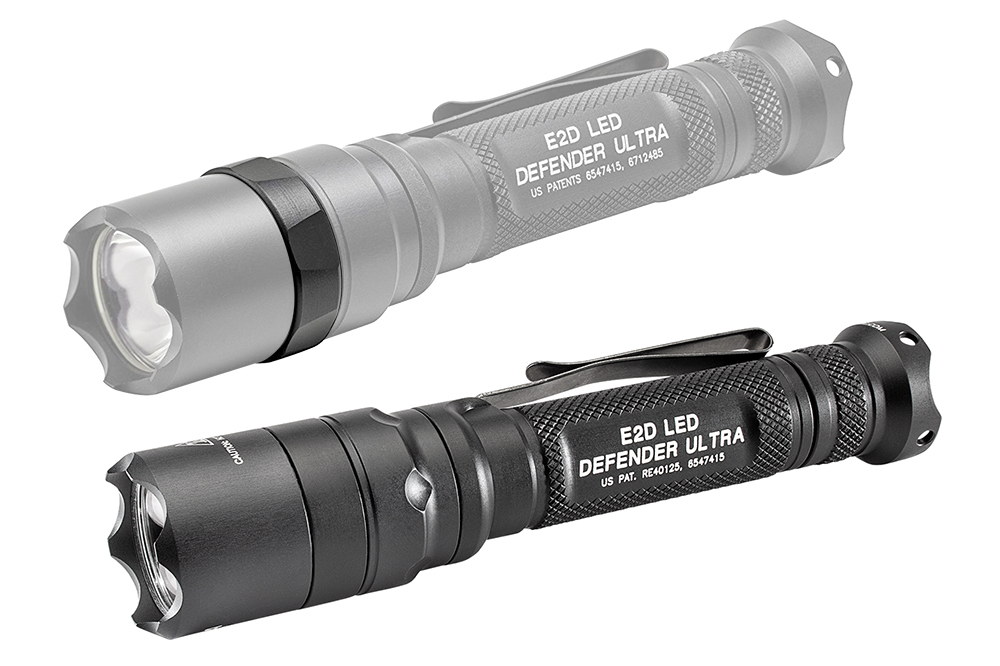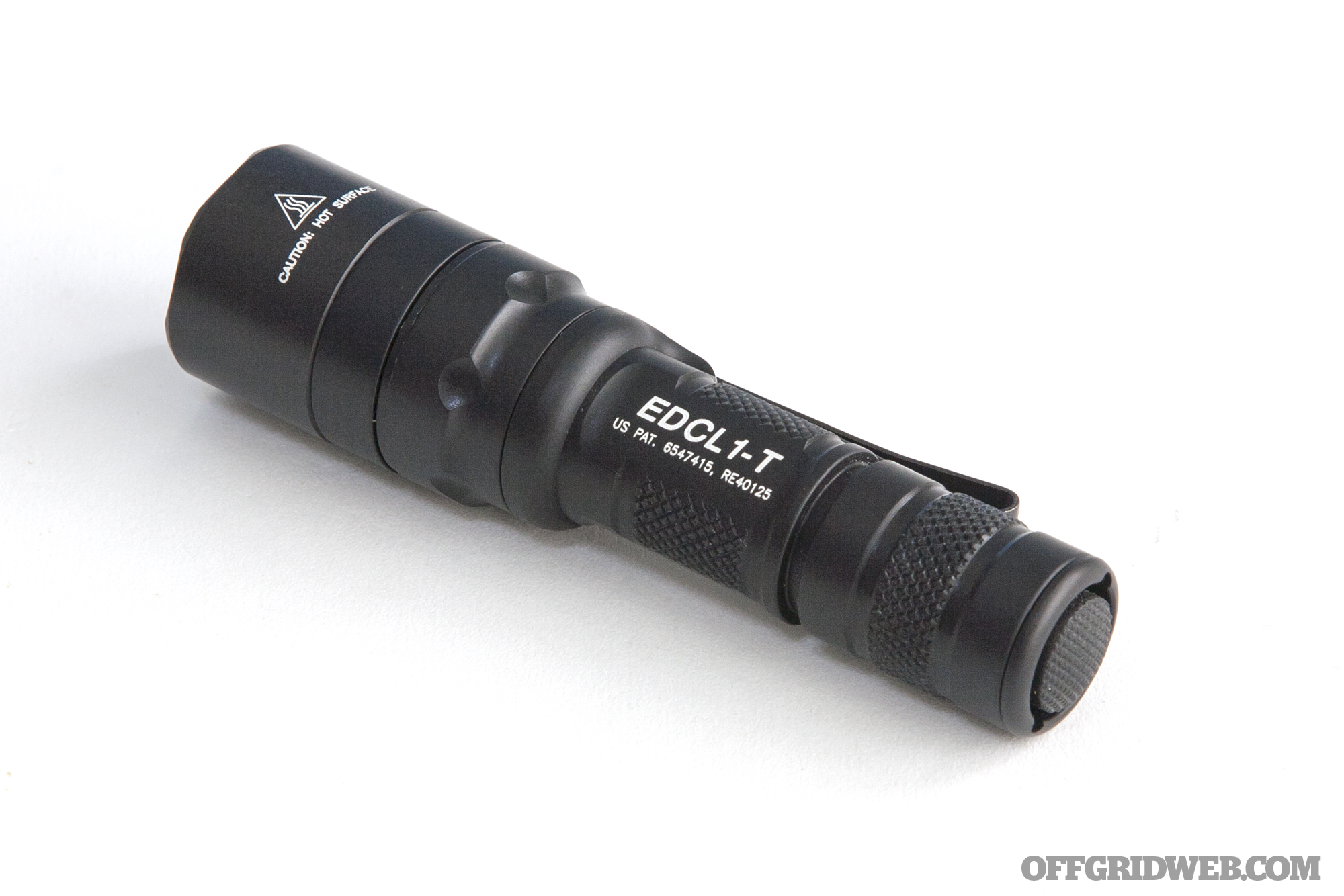RECOIL OFFGRID Gear Review: SureFire E2D LED Defender Ultra
What's the most-used tool in your every-day carry gear loadout? Ruling out bare essentials such as keys, cell phone, and wallet, your answer is probably one of two tools. The first is a pocket knife. It's beneficial to have a sharp blade at the ready at all times, despite fearmongering campaigns that claim the opposite. The second is a flashlight. Much like a knife, the more you carry this tool, the more you'll find yourself appreciating its importance. Rather than peering into the darkness or hoping the tiny LED on your cell phone will provide sufficient illumination, a dedicated EDC flashlight will allow you to perform countless low-light tasks more safely and easily.
Over the years, we've gone through quite a few different flashlights. We've reviewed and compared dozens of them in our HighLights and Pocket Preps columns, and have included one as a fundamental component of our EDC for many years. As a result of this, we've become what some might call picky, rarely settling down on a single light for long. We're always on the lookout for new options to add to the rotation — our latest acquisition is a revised variant of a classic design from SureFire.
Above: The SureFire E2DLU-A (top) next to a few of the other lights we've frequently carried — SureFire EDCL1-T (review), Fenix UC35 (review), and an old Streamlight ProTac 2L.

The SureFire Defender line of flashlights has been around for more than a decade, and the inclusion of the term “LED” in its name is an indicator of this fact. This light's predecessor, the E2D Executive Defender used a high-pressure xenon lamp that produced 60 lumens. No, we didn't forget a zero. Sixty. Thankfully, that technology has now been surpassed by more powerful, efficient, and reliable light-emitting diodes.
After that, output increased to 200 lumens with the introduction of the E2D LED Defender, and then increased again to 600 lumens with the E2D LED Defender Ultra. Finally, there's the latest iteration, which is (somewhat confusingly) still referred to as the E2D LED Defender Ultra. This model — which can be identified by the smooth ring around its head, as opposed to the last model's anti-roll ring — now offers a maximum output of 1,000 lumens. Lighting performance has come a long way since the 60-lumen Executive Defender, to say the least.

The 600-lumen LED Defender Ultra (top) featured an anti-roll ring. The 1,000-lumen version (bottom) does not.
The 1,000-lumen Defender Ultra is available in two variants: E2DLU-A and E2DLU-T. The former is what we chose, and offers dual outputs of 5 lumens or 1,000 lumens. The light must be cycled on and off rapidly to switch between the two modes. The latter Tactical model offers a single output of 1,000 lumens.
This light is constructed from hard-anodized aluminum with a knurled texture, crenelated striking bezel, scalloped tail cap, and dual-direction stainless pocket clip. It uses two CR123A batteries, and a TIR lens design that focuses light into a versatile blend of long-distance throw and peripheral visibility. Advertised runtime is 2.75 hours on high, or 63 hours on low.
After carrying the E2D LED Defender Ultra daily and using it extensively over the last few months, we found a lot of things we liked, and a couple we didn't.
Right off the bat, the light feels great in hand. If you need this light to live up to its defender name and use it as an impact weapon, the size is perfect for that task. The knurled texture and flared ends lock into your fist, ensuring the light won't slip as you hammer it into an attacker. And that crenelated bezel is sharp enough to do damage, but not ringed with mall-ninja-grade razor-sharp spikes like some lights we've seen. In the interest of being able to carry our flashlight everywhere we go, including through airports, we prefer this more-subdued appearance.
The stainless pocket clip allows the light to be carried tip-up or tip-down, but the former will cause the bezel to stick up prominently above the pocket hem. We noticed that this particular clip felt a bit looser than other SureFire clips we've used, but not to the degree that we worried about the light slipping out of a pocket.
We have mixed feelings about the scalloped tail cap. On one hand, it's helpful for the defensive function of the light, and prevents accidental button presses. On the other hand, it makes the recessed button a little harder to click, and prevents the addition of a Thyrm Switchback ring (if that's something you're into).
Lighting performance is outstanding. The 1,000-lumen, 10,600-candela beam cuts through darkness in open spaces, and provides a 200-meter reach. We were able to clearly illuminate trees on the other side of a pitch-black field, and light up large rooms inside a house with its sheer power. The TIR lens and slightly warm color temperature contribute to this visual performance.
However, this is a dual-output light, and that's something we need to address. The 1,000-lumen high setting is great for open outdoor spaces, or defensive situations where you may need to disorient an intruder. For close-up tasks, it's simply too much. To address this and make the light more useful for EDC, SureFire offers the E2DLU-A model with a 5-lumen low setting. That's perfect for map reading, lighting up the inside of a backpack, or inspecting a car's engine bay. But beyond 20 or 30 feet, it starts to feel dim.
This led to our biggest gripe with the E2D LED Defender Ultra — you get two extremes to choose from. We frequently found ourselves in situations where 1,000 lumens was too much, but 5 lumens was not enough. Like Goldilocks, we were searching for the middle ground that felt just right.
That's not to say this light needs three brightness settings, since that would complicate the controls, and there are plenty of competitors' lights that are guilty of tacking on too many unnecessary modes. We just wish that the low mode was a bit brighter. Somewhere around 25 lumens would be enough to light up a garage or backyard, without feeling too bright for closer tasks. It'd also extend battery life, since we'd spend less time defaulting to the 1,000-lumen mode.
As it stands, it feels like SureFire kept increasing the E2D's maximum output across generations, but left the 5-lumen low mode untouched. It feels that way because that's exactly what happened. This series went from 5/200 to 5/600 to 5/1,000-lumen settings over the last three major revisions.

The SureFire EDCL series offers similar features, but only comes with a non-click “gas pedal” tail cap.
For comparison, the SureFire EDCL1-T we previously reviewed (pictured above) offers a 600-lumen high mode and 5-lumen low mode, and that spacing felt a bit more practical. We used that light at high output most of the time anyway, since the non-click tail cap lends itself more to short bursts of bright light. Compared to 5/600, the 5/1,000 gap feels huge. However, we definitely prefer click tail caps, so that's a subjective point in the Defender Ultra's favor.
MSRP is $199 for either the single- or dual-output Defender Ultra, although we found it through third-party retailers for about $170. As always, we appreciate that SureFire lights are designed and manufactured in the USA, and offer a lifetime no-hassle guarantee. SureFire reliability is rock-solid, and that's a critical factor for any EDC flashlight.
Overall, the E2D LED Defender Ultra is, as expected from SureFire, a very solid flashlight. Its light output and quality are superb, and well-suited to the defensive applications its name indicates. It also fits the hand well, and makes an effective impact weapon without appearing overtly aggressive. The dual-output modes aren't ideal for every situation, and we'd prefer a brighter low setting, but they serve most purposes reasonably well. This light isn't the end-all be-all solution for every task, but it'll certainly remain in our everyday-carry rotation for the foreseeable future.
Pros:
Cons:
For more information on this and other SureFire flashlights, go to SureFire.com.
 STAY SAFE: Download a Free copy of the OFFGRID Outbreak Issue
STAY SAFE: Download a Free copy of the OFFGRID Outbreak Issue
No Comments